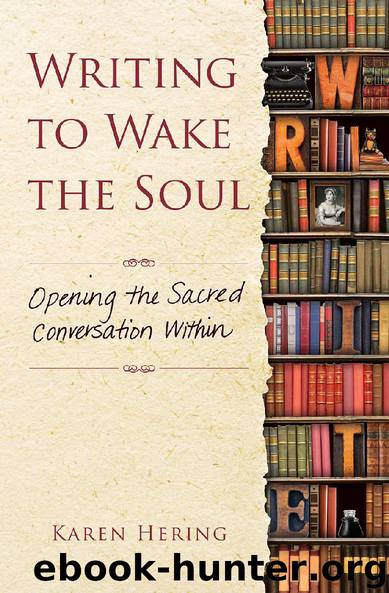Writing to Wake the Soul by Karen Hering

Author:Karen Hering
Language: eng
Format: epub
Publisher: Atria Books / Beyond Words
COSMIC ORDER
She who is centered in the Tao
. . . perceives the universal harmony,
even amid great pain,
because she has found peace in her heart.
—L AO TZU 11
Little is known about the specifics of ancient Egyptian law, but what has survived across the millennia is the spirit of justice, or Ma’at, on which Egyptian law and society were based. For the ancient Egyptians, the term Ma’at meant essentially the way things are in the natural world, the right and reliable order of the cosmos that keeps the sun rising every day and the seasons turning every year. Egyptian rulers were said to have “done Ma’at” when they ruled justly, aligning with this larger order. Ma’at was also a name for the goddess of justice, truth, and order who judged the dead in the Egyptian underworld by weighing the heart of each arrival on a swinging balance against a feather. Only those with hearts sufficiently lightened by “doing Ma’at”—hearts, unburdened by wrongdoing, that could balance the weight of a feather—were permitted into the afterlife.
This emphasis on the underlying order of the universe was prominent in ancient matriarchal and agricultural societies, and is found in many indigenous religions around the world. Overriding the dualities of good and evil, the concept of justice in these cosmologies was holistic, embedded in the natural world with its cycles encompassing both birth and death while leaning in the larger sense toward life.
In varying degrees, Taoism, Hinduism, Buddhism, and even the Abrahamic religions carry similar ideas of justice as the underlying order of the universe. It is free will that has opened the hatch through which we keep slipping out of this larger relationship and order. Perhaps, then, before justice was ever carved into stone or in human decrees of law, first and foremost, it was tucked more indelibly into the essence of all life, written into the fiber of being itself, woven into all right relations. No wonder we keep missing it; it’s been hidden inside the very fabric of relationship and love, and in the ecological web of life that holds us all.
Today, insulated as many of us are from wilderness or even from small natural landscapes, and accustomed as most of us are to unsustainable levels of consumption, we are often blind to the justice found in nature’s underlying order. Instead, we regard justice as something that must be imposed on humans as a correction to our inclination toward violence and self-interest. But sociologists and ancient sages alike say it isn’t so. Many recent studies have explored the ancient roots of cooperation as a necessity for human survival and flourishing. And as far back as the fourth century BCE, the Chinese philosopher Chuang Tzu noted that we might lack awareness of foregone societies built on justice, because they were so well aligned with the natural order that no one thought to record them:
In the age when life on earth was full, no one paid any special attention to worthy men [. . .] they were honest and righteous without realizing that they were “doing their duty.
Download
This site does not store any files on its server. We only index and link to content provided by other sites. Please contact the content providers to delete copyright contents if any and email us, we'll remove relevant links or contents immediately.
Becoming Supernatural by Dr. Joe Dispenza(8217)
Crystal Healing for Women by Mariah K. Lyons(7930)
The Witchcraft of Salem Village by Shirley Jackson(7274)
Inner Engineering: A Yogi's Guide to Joy by Sadhguru(6794)
The Four Agreements by Don Miguel Ruiz(6765)
The Power of Now: A Guide to Spiritual Enlightenment by Eckhart Tolle(5781)
Secrets of Antigravity Propulsion: Tesla, UFOs, and Classified Aerospace Technology by Ph.D. Paul A. Laviolette(5371)
The Wisdom of Sundays by Oprah Winfrey(5161)
Room 212 by Kate Stewart(5121)
Pale Blue Dot by Carl Sagan(5008)
Fear by Osho(4740)
The David Icke Guide to the Global Conspiracy (and how to end it) by David Icke(4719)
Animal Frequency by Melissa Alvarez(4472)
Rising Strong by Brene Brown(4459)
How to Change Your Mind by Michael Pollan(4356)
Sigil Witchery by Laura Tempest Zakroff(4246)
Man and His Symbols by Carl Gustav Jung(4135)
The Art of Happiness by The Dalai Lama(4130)
Real Magic by Dean Radin PhD(4129)
